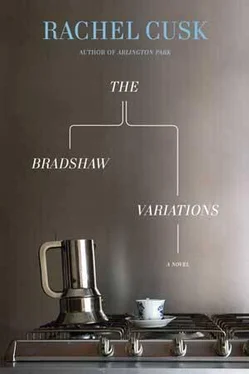*
He makes things for Alexa to eat, things that she likes. He washes her hair. He polishes her school shoes and sets them on newspaper beside the door. He knows which days she needs to take her gym kit to school. He sits with her while she does her homework, and makes sure she gives it in on time. At night, when she changes into her pyjamas, he observes with an artist’s satisfaction the felicity of the white smocking against her skin, the exactitude of her inky brows and eyelashes, the sculptural rightness of her limbs. And the health of her hair and gums and fingernails, the acuity of her responses, even the sleep she takes, the restorative quality of its pause: it confirms him, reflects him, though she has her own existence. It because she has her own existence that the confirmation comes. He is forming her out of the substance of what she already is. He is guiding her to her own perfection. It would be possible to ruin Alexa, to neglect or destroy her. There is no other person over whom he has this power.
The house is orderly and clean.
At the beginning of February Tonie’s boss glances up from his desk and says,
‘The honeymoon period’s over now.’
It is a grey lightless afternoon and the darker grey interior of the building is a grid of monochrome squares and rectangles that form strange block-like avenues of perspective leading nowhere. The whole place is a maze of corridors and staircases, of anonymous rooms jigsawed with desks and metal filing cabinets and identical black-upholstered chairs. This cluttered rectilinear gloom signifies thought, intellect, impersonal endeavour. Tonie has noticed how the human form is elided by its geometry: here she seems only to see people in parts, a pair of legs in a stairwell, a back disappearing through a doorway, a profile glimpsed through a shatter-proof glass panel, bent over a desk.
‘The honeymoon period’s over now,’ Christopher says, silhouetted by the grey light of the institutional window. ‘At this point we need you to be functioning independently.’
‘All right,’ Tonie says, after a long pause.
Christopher’s office is more home-like than the others. As Head of School he has a slightly larger version of the cubes the rest of them occupy. He has lamps on low tables, cushions, a rug on the floor. Since September she has come here several times each week, assuming herself to be entering the territory of an ally and friend. She likes to sit on Christopher’s dove-grey sofa and consider the view, his orderly bookshelves, his framed Dutch prints. Now she wonders whether it is Christopher’s house that is neutral, impersonal, or whether it exists at all; whether this office in fact is all he is, a man in a room which despite its atmosphere of comfort is still only ten feet wide.
‘All right,’ she says.
‘I’m always available to answer questions,’ he says, ‘but my time is apportioned to favour the bottom end of the structure. I need to consider those younger, less experienced colleagues who have genuine reasons for requiring my help.’
Tonie is used to Christopher, used to his voice and appearance, to the reedy sound he makes, to the precision of his bachelor tastes, to the sight of his long, narrow form among other forms she knows. For years she has watched him go off to his lunchtime organ recitals at St John’s, his medieval recorder evenings, his private views. Yet she has never, until now, put all those things together. She has never added him up.
‘Fair enough,’ she says.
‘There simply isn’t the infrastructure here for members of the department to be carried. We don’t have the resources.’
‘I get it,’ she says.
Tonie has been associated with the English department for eight years. In that time she has seen people argue, flounce out of meetings, cry openly in corridors. She knows that emotion is a possibility here, as it is not elsewhere in the university or, indeed, the world. As a result the departmental discourse relies heavily on its bureaucratic origins. The grey walls pulse with rampant sensibility: only the rules stand in the way of a general outbreak of unconstrainable feeling. Now that Christopher has invoked this discourse, it would be perfectly acceptable for Tonie to shout at him, to weep, to storm back to her own cheerless office with its view of the car park; it is, perhaps, what Christopher expects and requires her to do.
She looks at his pleated silk lampshades, at his mohair cushion covers.
‘Thanks,’ she says. ‘Thanks for the honeymoon. I enjoyed it.’
She laughs quietly, turns to go.
He stiffens in his chair, offended. ‘As I say, I’m always reasonably available. And obviously, if any question is urgent I’ll answer it.’
She laughs again. Once, she was Christopher’s senior in the department, when he was a junior research fellow with a neck so slender his collars gaped around it. And he fawned on Tonie in those days, hungry for scraps of approval. It is this version of himself, she sees, that haunts him. He wants to exorcise it, to gouge it out of her recollection. He doesn’t realise how many things have happened to her in the intervening years, how little she has considered him. He doesn’t know how sad she suddenly finds it, that he should have spent his prime struggling to ascend through the ranks of a second-rate university, with only distracted mothers to impede him.
‘I’ll bear that in mind,’ she says.
Outside, in the corridor, she realises that her arms are full of files. She looks down at them. They are hard, blank-faced, with metallic spines. She is holding them against her chest. For a moment she can’t think what on earth they are.
Thomas wakes up. He has been dreaming. In the dream he and Tonie and Alexa were in some kind of shopping mall in a foreign city. It had long, grey, sinister concrete walkways as broad as motorways. There were layer after layer of them, travelling downwards into the earth.
Thomas and Tonie wanted to buy clothes for Alexa. They left her somewhere and found a small shop. The shop was full of light: its walls and ceiling were all glass. Thomas began to look at the clothes. They were very beautiful. He found a dress that was like a meadow of flowers, and another that was made of pieces of white cloud. There was a flowing garment like a Grecian tunic, composed of milk. Tonie had her own ideas, but every time Thomas found something she forgot them. She seemed to know that all of a sudden he had a special power of discovery. She waited to see what he would come up with next. From the rack he pulled a long-sleeved dress made from the original canvas of Botticelli’s The Birth of Venus . At its cuffs and hem were flames that flickered palely in the daylight. They agreed that this was the supreme find. It was for Alexa: it seemed to contain something of her spirit, some essence of her they recognised but had forgotten, as though it had been present at the moment of her birth but had been obscured or diluted over the years by Thomas and Tonie themselves. Now that they had chosen, Tonie volunteered to go and retrieve Alexa. She left Thomas alone in the shop. She vanished into the vast grey intestine of the shopping mall. He wondered then why they had abandoned Alexa in this strange place. He had no idea where she was or what had become of her. What had he and Tonie been thinking of? The irrationality of it spoke to him through the dream. He strained and strained to understand why they had committed this irresponsible act. At last he realised that it was because this was a dream. The realisation immediately woke him up. It seems that it requires faith to dream. Once you have lost it the dream comes apart in your hands.
He lies awake in the darkness. It is so thin, so insubstantial: he feels as if he is falling through it, plummeting outwards or downwards. The universe yawns around him. He seems to see its infinite distances, its rashes of stars. The bed is like a tiny precipice on the edge of it. His contact with material things feels thread-like and minimal. It is the irrationality of the dream that has caused him to feel this. His own belief in his life seems in that moment incredible to him. Why doesn’t he cling to the edge of the bed in terror? Why doesn’t everybody? And Alexa, Tonie — what are these people to him? What are these relationships, these convictions, these codes of conduct? This forest of objects, dark now and indistinct — what is their significance? How can he have chosen them, the armchair, the chest of drawers, the dark ornaments on the mantelpiece in their darker ponds of shadow, when the universe was yawning just to the side of them?
Читать дальше












